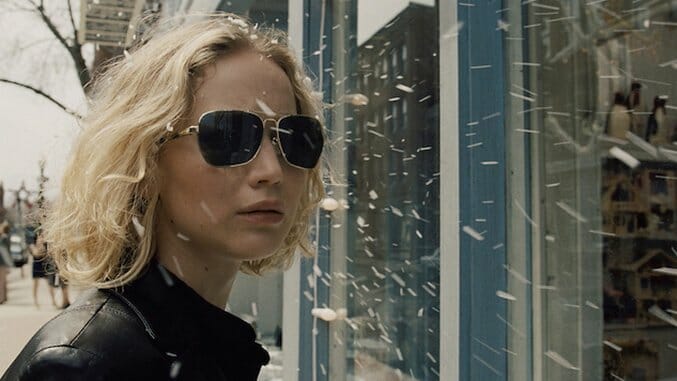Joy

With his latest tale of hustling entrepreneurs, David O. Russell employs a particularly loose directorial hand, allowing his narrative to scramble madly in myriad directions. And while this approach initially stokes the sort of low-grade mayhem that has made his recent screwball melodramedies so transfixing, the tonal tilt-a-whirl ultimately gets tangled up in the long leash it’s been allowed. As it pushes on toward the end credits, this quasi-biopic about as-seen-on-TV self-made millionaire inventor Joy Magnano chokes the life out of itself.
Few directors excel at assembling the wonky mechanics of dysfunctional families like Russell. Here, he’s housed his sideshow of underclass grotesques in a rickety suburban Long Island home that appears to be looking for an excuse to implode. Relinquishing the wild card roles of Silver Linings Playbook and American Hustle, Jennifer Lawrence here inhabits a character who single-handedly lends ballast to a combative extended family that includes her mother Terry (Virginia Madsen), who’s been left bedridden by heartbreak and neuroses; her crooner ex-husband Tony (Édgar Ramírez), who’s holed up in the basement; her saintly grandmother Mimi (Diane Ladd), who lingers like an angel from Wings of Desire; her spiteful half-sister Peggy (Elisabeth Röhm), who possesses a pit bull’s disposition; and her lothario father Rudy (Robert De Niro), who’s just been “returned” to the family by the latest in a long line of exasperated exes.
Charged with navigating a half-dozen equally fraught relationships, Lawrence is at the top of her dexterous game. Her Joy is a woman who’s spent her life learning how to coax instances of humanity out of kin who are more inclined to conduct themselves like feral animals. It’s a deeply sympathetic depiction of an indomitable woman who’s sublimated her own desires. While it’s evident that she’s her father’s daughter and a romantic at heart, circumstances have dictated she play the pragmatist. Consequently, there may not be a more cathartic sequence this past year than when Joy vents her frustrations by picking up a pump action shotgun and firing off a few rounds.
Russell opens Joy with a scene from the soap opera that keeps Terry anesthetized, thus serving notice that his film will be operating at a heightened emotional register. (The addition of Isabella Rossellini—playing Rudy’s combustible new flame Trudy—to his stable of actors is a masterstroke, as she’s well practiced in the art of hysterics.) And, with his notably stilted staging of the soap, he suggests the plot contrivances of daytime television are no match for the cutthroat tensions and desperate struggles that unfold every day in actual households.
-

-

-

-

-

-

-

-

-

-

-

-

-

-

-

-

-

-

-

-

-

-

-

-

-

-

-

-

-

-

-

-

-

-

-

-

-

-

-

-








































